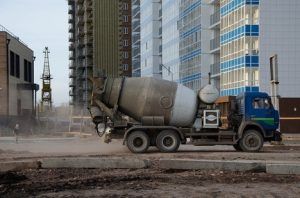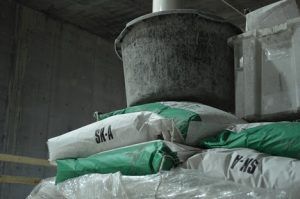
Home projects have become a favorite activity of homeowners everywhere recently. This is likely due to the price reduction that comes when you do your construction yourself. It is also just very fun and rewarding to build something you are going to be able to use every day.
One of the easier projects to do on your own is mixing and pouring concrete. Concrete is an essential part of many home projects. If you want to build a deck, lay tile, or fix up your foundation, you are likely going to be using a concrete contractor to get the job done right.
However, it can seem overwhelming to mix and use concrete yourself, especially if you believe you need a huge truck to mix and pour concrete. Luckily, there are several different ways to mix concrete, many of which are easy to do by yourself. Here are a few of the different methods you can use when mixing concrete for any project you decide to take on.
1. Wheelbarrow Method
This method of mixing concrete is great for bigger quantities of concrete. For instance, if you are laying down a patio or dumping lots of concrete then this is likely the best way to mix and haul the amount of concrete you need quickly and easily. The first tool you need for the wheelbarrow method is, obviously, a wheelbarrow.
Once you have your wheelbarrow set up it is time to start mixing the concrete to create the right texture. A bigger surface is going to require more concrete so you are likely going to need more than one bag. Make sure you have the right amount of concrete before you start a project so you can estimate the cost and time you will spend working.
When your concrete powder is in the wheelbarrow you can begin adding water. Your bag of concrete should tell you how much water to add in the manufacturer’s instructions. Add your water slowly so you can keep an eye on the texture. Too little water can be fixed, too much water is a little harder.
Finally, mix your powder and water together with a shovel or garden hoe to create the wet, pourable concrete you are going for. A good test to make sure you got the right texture is putting a little of the concrete into a cup and pouring it over a flat surface and seeing how much the concrete falls. If the concrete flattens about halfway then that is perfect. If it goes all flat or stays standing then you will need to add more water or more powder to fix the texture.
2. Bucket Method

For this method, all you need is a bucket, a drill, and a paddle mixer. This is a great way to mix concrete if you plan on bringing the mixture into a house or need to be able to move the concrete mixture quickly and easily. It is currently one of the most popular methods in home renovations and improvements.
You want to start with a bag of concrete and the correct water amount for the concrete brand and size bag you have chosen. It is unlikely your bucket will be able to hold more than one bag which is why this method might be a little slower than the wheelbarrow method. Carefully pour the concrete and water into your bucket. It is important that, unlike in the wheelbarrow method, you pour the concrete powder into the clean water you should have already put in the bucket.
Finally, you want to get out your drill with the paddle mixer attached. Mix the concrete in bursts with your drill to make sure all of the powder gets mixed in and so you can keep a close eye on the texture in case you need to add water. After that, your concrete should be ready to go wherever you can carry it.
Many people swear by this method for jobs both big and small. Though a bucket carries less concrete than a wheelbarrow, it is also easier to cart around and simple to mix up with the drill. Whichever method you choose you will end up with the same product of wet concrete.
3. No Mix Method
This is a method that is used almost exclusively for building concrete walls. Specifically, retaining walls for yards, streams, or even entire rivers. This method of concrete pouring is probably the easiest and leaves you with a very unique wall that will stand against the elements for many years to come.
For this method, all you are going to need is enough bags of concrete to stack to the height and length you want your wall and a hose with access to plenty of water. The conventional way of building a concrete wall, with square bricks of concrete, is very difficult to accomplish for a beginner which is why this method was developed to make it easier and add a new look. This simple method does not even require you to take the concrete powder out of the bag.
Stack the concrete bags on top of one another with one bag placed in the middle of the two bags below it to create a solid surface that will not fall over. Continue stacking bags of concrete until your wall has reached the desired length and height. Then, soak the bags with a hose until all of the bags are soaked through and the concrete inside seems to be the right texture.
This will leave you with a wall made of wet bags of concrete until the solution inside settles and dries. Once your bags are dry you can tear the paper away, leave it to erode naturally, or burn it off in a controlled fire. Voila, you are left with a beautiful concrete wall that required no mixing and will stand for at least the next few decades.
Conclusion

Concrete is a solution that requires a little extra care than many other building materials. Specifically, the amount of water you add and the texture you end up with is very influential to the result you end up with. That is why it is so important to know your mixing method before you begin.
When working with concrete, make sure you have all of your tools and ingredients laid out before you begin mixing so you do not have to run around and waste drying time. This includes the safety tools you need to be using when handling concrete like a mask, gloves, and safety glasses.
Mixing concrete is simple as long as you do it correctly. Stir slowly and pay close attention to the texture as you add in the water or powder to your mixture. These methods provide you with great options for mixing and pouring concrete for your next project.











